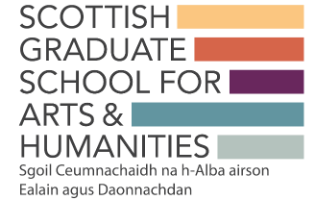Creating a SGSAH EDI (Equalities, Diversity & Inclusion) Code of Conduct
Published: 16 September 2021
The Scottish Graduate School for Arts & Humanities (SGSAH) is the World’s first national graduate school of this type, with members from across Scotland, from the Highlands and Islands to the Scottish Borders, the oldest and the newest universities in the country, four art schools and the national Conservatoire. SGSAH is delighted to support this three-month internship opportunity for a doctoral researcher to help devise a new EDI code of conduct for SGSAH and its stakeholders.
Organisation
The Scottish Graduate School for Arts & Humanities (SGSAH) is the World’s first national graduate school, with 17 member HEIs from across Scotland, from the Highlands and Islands to the Scottish Borders, the oldest and the newest universities in the country, four art schools and the national Conservatoire.
Location
We are flexible in terms of working practices. All of the work can be done remotely, with regular supervisory meetings on Teams/Zoom. If the intern prefers, they may also have access to hotdesking space in Lilybank Gardens (depending on availability of office space), with regular in-person supervisory meetings.
Project
The successful researcher will be supported by Anindya Raychaudhuri, EDI Lead for SGSAH The intern will work alongside SGSAH’s EDI committee and broader stakeholders, in order to devise a new code of conduct. This will involve researching policy documents from comparable organisations - especially in the contexts of broader PGR funding landscape, and specifically in relation to AHRC/UKRI (Arts and Humanities Research Council/UK Research & Innovation), SFC (Scottish Funding Council) and individual HEI (Higher Education Institute) policies. The successful candidate may also be involved in collecting feedback from staff and students about the nature and scope of the code, and liaising with stakeholders on the final drafting and implementation of the code. The candidate will also be able to help with researching, developing and delivering wider policy and activities in line with SGSAH’s commitments and responsibilities in the area of equalities, diversity and inclusion with regards to arts & humanities doctoral study.
Outputs
We will support the intern to achieve the following results:
- Drafting an EDI code of conduct for SGSAH · Delivery of a series of consultation events with stakeholders
- Liaise with the EDI lead on creating a set of policies and activities in line with the new code of conduct
- Liaise with the SGSAH team on its plans to mark the 10-year anniversary in 2024, and ensure that the EDI code of conduct is integrated throughout all the proposed activities.
Timescale
Start date(or must start by): 1 April 2024
Examples include:
- Single block of 12 weeks
- Multiple shorter blocks
- Longer less intensive engagement, e.g. one day per week, one week per month
- Mixture of the above
Flexible based on the intern’s other commitments.
Benefits to the Host
SGSAH currently does not have a comprehensive EDI code of conduct. As an organisation which liaises with multiple stakeholders, any workable code will inevitably be a complex document covering a variety of staff and student roles. The devising and implementing of such a code would enable us to ensure that all stakeholders interacting with SGSAH are aware of our EDI policies and practices, and the need to ensure all activities are compliant with our principles.
Benefits to the Researcher
Benefits include:
- Practical experience working with a dynamic team within a fast-moving and multi-faceted environment
- Developing a clearer insight of EDI issues in the UK HE sector.
- Practical experience undertaking formative development of strategic documentation in and beyond higher education.
- Widening network of key contacts and engaging with wide range of individuals and organisations
- Understanding strengths and limitations of different evidence sources in strategic development
- Flexibility of approach.
Skills include:
- Applying self-direction and motivation
- Solution-focused approach
- Well-developed written and oral communication
- Understanding and synthesising concepts and ideas quickly · Responsiveness to needs of partners and stakeholders
- Teamwork, skill sharing and support with a wide range of people.
Key Relationships
- SGSAH team constituting a range of academic/professional services staff
- Any other SGSAH research intern
- SGSAH blogger and digital curator
- Current stakeholders: HEI members (academic and professional services staff), external partners, doctoral researchers, applicants and alumni
- Sectoral and external experts in EDI
Person Specification
|
E |
D |
Essential/Desirable |
E |
D |
Essential/Desirable |
|
A1 – Knowledge Base |
C1 – Professional Conduct |
||||
|
X |
|
Subject Knowledge |
|
X |
Health and Safety |
|
X |
|
Research methods – theoretical knowledge |
X |
|
Ethics, principles and sustainability |
|
X |
|
Research methods – Practical application |
|
X |
Legal requirements |
|
X |
|
Information Seeking |
|
X |
IPR and copyright |
|
X |
|
Information literacy and management |
X |
|
Respect and confidentiality |
|
|
X |
Languages |
X |
|
Attribution and co-authorship |
|
X |
|
Academic literacy and numeracy |
X |
|
Appropriate practice |
|
A2 – Cognitive abilities |
C2 – Research management |
||||
|
X |
|
Analysing |
|
X |
Research Strategy |
|
X |
|
Synthesising |
X |
|
Project planning and delivery |
|
X |
|
Critical thinking |
|
X |
Risk management |
|
X |
|
Evaluating |
|
|
|
|
X |
|
Problem Solving |
|
|
|
|
A3 – Creativity |
C3 – Finance, funding & resources |
||||
|
X |
|
Inquiring minds |
|
|
Income and funding generation |
|
X |
|
Intellectual insight |
|
|
Financial management |
|
X |
|
Innovation |
|
|
Infrastructure and resources |
|
X |
|
Argument construction |
|
|
|
|
X |
|
Intellectual risk |
|
|
|
|
B1 – Personal qualities |
D1 – Working with others |
||||
|
X |
|
Enthusiasm |
X |
|
Collegiality |
|
X |
|
Perseverance |
X |
|
Team working |
|
X |
|
Integrity |
|
X |
People management |
|
X |
|
Self-confidence |
|
|
Supervision |
|
X |
|
Self-reflection |
|
|
Mentoring |
|
X |
|
Responsibility |
|
|
Influence and leadership |
|
|
|
|
X |
|
Collaboration |
|
|
|
|
X |
|
Equality and diversity |
|
B2 – Self management |
D2 – Communication & dissemination |
||||
|
X |
|
Preparation and prioritisation |
X |
|
Communication methods |
|
X |
|
Commitment to research |
|
|
Communication media |
|
X |
|
Time management |
|
|
Publication |
|
X |
|
Responsiveness to change |
|
|
|
|
|
|
Work-life balance |
|
|
|
|
B3 – Professional & career development |
D3 – Engagement and impact |
||||
|
|
|
Career management |
|
X |
Teaching |
|
|
X |
Continuing professional development |
X |
|
Public Engagement |
|
|
X |
Responsiveness to opportunities |
|
X |
Enterprise |
|
|
X |
Networking |
X |
|
Policy |
|
|
X |
Reputation and esteem |
X |
|
Society and culture |
|
|
|
|
X |
|
Global citizenship |
Click here to apply
First published: 16 September 2021



